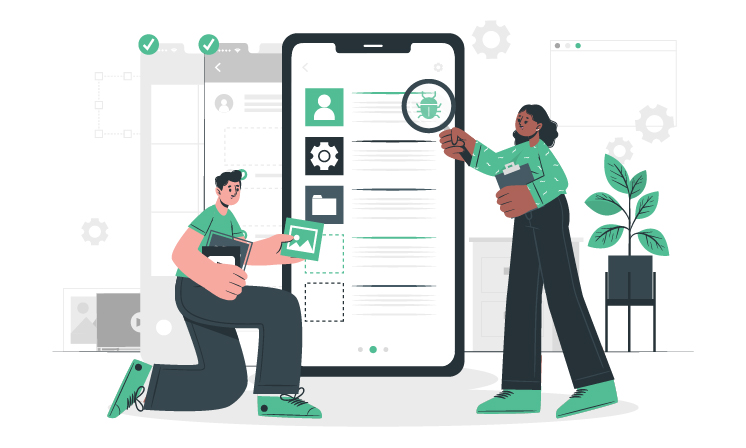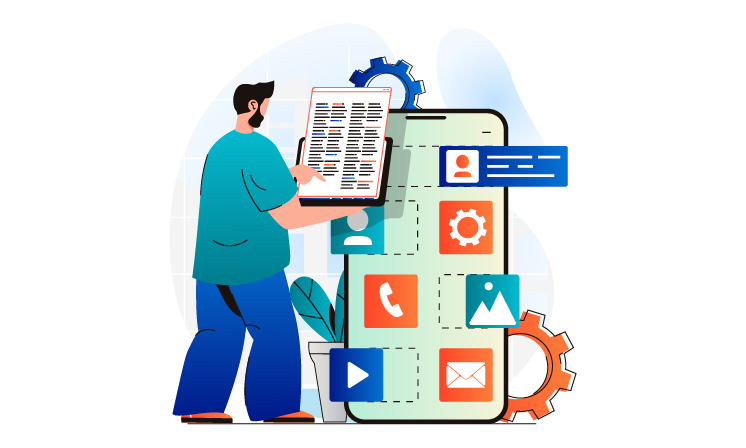Mobile app testing is crucial for any business to establish its name and reputation in the digital landscape. With each passing day, mobile devices and platforms are growing rapidly.
Therefore, businesses must ensure their potential apps function seamlessly on multiple mobile devices and platforms.
As users turn to mobile devices in huge numbers for everyday tasks like socialization, online banking, online shopping, e-learning, and more, the significance of thorough mobile app testing has grown even more.
This extensive guide will discuss what mobile app testing is and how businesses can proactively negotiate various associated challenges by following multiple best practices and tips according to their needs.
What is Mobile App Testing?

Mobile app testing is a process that validates a mobile app, whether Android or iOS, based on its functionality and usability. The process usually takes place before the app is released publicly.
This process also allows businesses to verify if the app fulfills the required business and technical requirements. App testing teams evaluate the performance of any mobile app across various operating system versions, network bandwidths, and screen resolutions.
By doing so, mobile apps will likely perform above their potential and surpass users’ expectations across multiple devices when released publicly.
Mobile App Testing Types – Automated vs. Manual Testing
There are two fundamental types of mobile app testing: automated and manual.
Automated app testing consists of various tools and software that help perform tests and identify issues. On the other hand, manual testing mainly relies on emulators or physical devices, playing a pivotal role in identifying bugs and other issues.
Challenges Involved in Mobile Application Testing

Small and large businesses may face challenges while testing different mobile apps depending on their requirements. These challenges are:
Device Fragmentation
As discussed earlier, users want to use mobile apps on multiple devices, each with a different operating system, screen size, and carrier settings.
Therefore, app testing becomes a daunting task for app testers. They need to keep all these factors in mind when testing their apps.
App Security
A mobile app must be secure because privacy and security threats are rising daily. Businesses or organizations must take appropriate measures to protect their sensitive customer data. If your app is unsafe, hackers and other cybergoons can access your customer data, negatively impacting your credibility.
In this scenario, detailed app testing becomes a viable option security-wise. Moreover, app testing must allow businesses to safeguard their official and customer data from potential cyber-attacks.
Storage Problems
Different mobile devices come with varied storage capacities. Additionally, numerous users prefer low-storage devices due to affordability and other benefits.
In these situations, mobile app testing on low-storage devices becomes necessary because devices with low storage do not usually support mobile apps that take up so much space.
So, app testing teams must ensure that they examine their apps on multiple smartphones and mobile devices to see if apps support devices with low storage.
In short, you should create mobile apps that take up less space and support mobile devices with varied storage capacities.
Why is Mobile App Testing Beneficial for Your Business?
Apps need to be fast and compatible with different mobile devices. The number of mobile users worldwide will reach 7.5 billion by 2026.
Therefore, businesses must accelerate the mobile app development process globally to make business services and products accessible and affordable.
Simply put, businesses need to develop optimized mobile apps that support advanced mobile phones in the future. Thus, mobile app testing teams and departments must test contemporary and potential apps on the latest smartphones and mobile devices.
Best Practices For Successful Mobile App Testing
When improving the impact of mobile app testing, one should consider the significance of results-driven tools and the right approach.
Here are various best practices you can follow to deliver impactful mobile apps to your target users:
Testers and Developers Collaboration
App testers and developers must collaborate to ensure the success of the mobile app testing process and help them achieve long-term goals. When they work as a team, they can ensure their app works smoothly and exceeds customers’ demands.
Mobile app developers need to include a team of app testers in the development phase to proactively identify potential issues in advance and offer solutions to such problems.
Test-Driven Development
Test-driven development, or TDD, is a software development approach focusing primarily on each functionality piece. As a result, it helps software developers write correct codes.
TDD’s role is handy when testing mobile apps because it allows developers to test each piece of functionality in detail. Once the functionality piece is tested successfully, developers can easily integrate it into the app.
Hence, the app works perfectly without issues across multiple mobile phones and devices. Furthermore, the app excels at optimizing user experience.
Early App Testing
Testing your mobile app during the development phase is beneficial. It is better to test your app regularly to address various shortcomings and issues proactively.
Otherwise, these issues can hamper the app development process, and you may need more time to launch your potential mobile app.
CI/CD (Continuous Integration and Delivery)
The effectiveness of the app testing and deployment process largely depends on CI/CD (Continuous Integration and Delivery). The practice helps automate the testing and deployment phase.
It also allows developers and testers to evaluate the changes thoroughly and deliver them to users quickly. The best thing about (CI/CD) is its testing and integration, making a mobile app powerful and results-driven during development.
Useful Tips for Impactful Mobile App Testing
Engaging yet result-oriented app testing takes numerous factors into account. Frankly speaking, these factors greatly affect the user experience as a whole.
Here are a few tips explained below to revolutionize your mobile app testing process:
Use Real Devices to Evaluate Your App
You must test your app on real devices, which is why simulators and emulators can be beneficial. You must also evaluate your app on several devices to tackle issues and discrepancies not usually found when using simulators and emulators for testing purposes.
Your Mobile App Should Support Various Operating Systems and Devices
If you want to effortlessly retain and expand your customer base, build an app that works flawlessly on multiple operating systems and devices. You must also perform thorough testing on various devices and operating systems.
Thus, you can quickly check if your app supports the latest operating systems and devices. Testing aside, you can see if your app is compatible with all technologies your customers have deployed on their devices.
Benefit From Usability Testing
Businesses should concentrate on gathering user feedback when testing mobile apps for varied target customers. As a result, companies willing to optimize their mobile apps for better user experience can work on areas that require improvement.
The application of usability testing varies from user to user. Moreover, you can conduct in-person testing, taking feedback from real users. Likewise, you can perform remote testing using various online tools.
That said, businesses must conduct usability testing during the app development process, allowing them to meet users’ demands or preferences appropriately.
Mobile App Testing Statistics
- 80% of users remove or uninstall an app that does not fulfill their demands and expectations.
- 50% of customers will likely uninstall an app that takes up so much space.
- 48% of users abandon or uninstall an app if it is not fast.
Wrapping Up
There, you have it, folks. We expect you to appreciate our guide, which suggests that app testing is a challenging and ongoing task requiring ample time and effort.
By collaborating with your app development and testing team, focusing on user feedback, and utilizing the latest tools and techniques, you will likely develop a near-perfect mobile app for your business. This app will offer customers real value and an engaging user experience.
